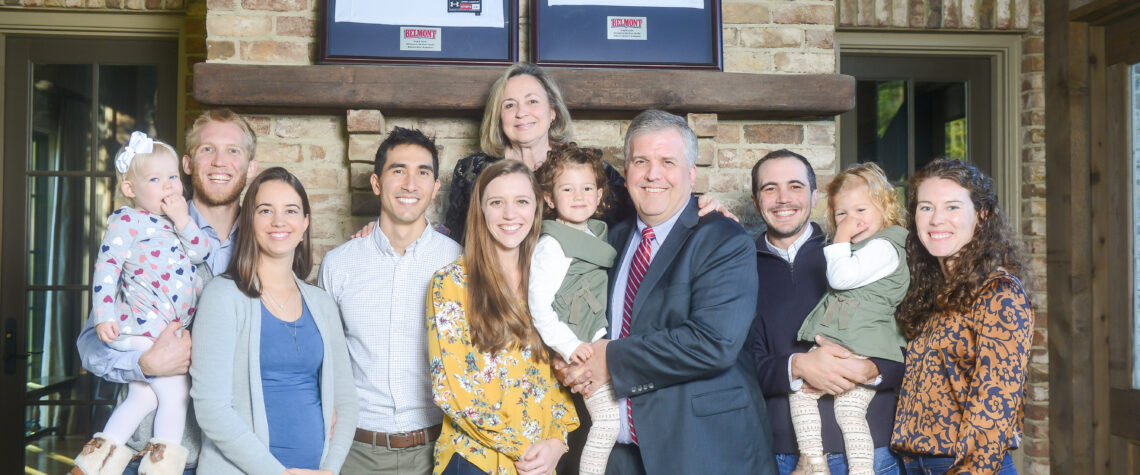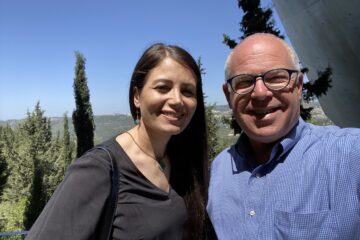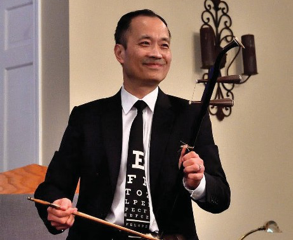When Belmont University president Greg Jones talks about his vision for the Nashville school, his voice fills with pride and excitement. It’s easy, in fact, to join in his enthusiasm as he shares the plans for creating the leading Christ-centered university in the world.
‘It’s a high bar we’ve set for ourselves,” Jones said, “but one we’re committed to.”
According to Jones, the University recently created a new strategic plan through the input of faculty, staff, and students for what would be accomplished by the year 2030. It’s a visionary strategy that focuses on creating leaders who will make a real impact on the world around them.
For Jones, the strategy is one that stems from his own background and faith.
An Abundant Faith
Jones was born in Nashville, moved away as a baby, and grew up in a close Christian family; he followed in the footsteps of five generations of United Methodist preachers, something which he said he briefly rebelled against.
“There was no rebellion against my faith, but against the family tradition. One thing I knew was that I didn’t want to go into the family business of preaching,” he laughed. “But God has a way of not listening to your rebellion and continuing to call and woo you.”
An ordained Methodist minister, Jones holds a bachelor’s and master’s degree from Denver University and a Ph.D. in divinity from Duke University; he served as the longtime dean of Duke Divinity School before his appointment to Belmont in June of 2021. He also served as executive vice president of Baylor University and is the author of 19 books.
Over the years his faith walk has intersected with his academic work, as he’s tried to create an environment–in his own home, as well as on college campuses–that is authentic and hopeful.
According to Jones, there’s a challenge today in presenting Christ in that authentic, hopeful way.
“The term Christian has gotten to be problematic for a lot of people for the way it has been used,” he said. “We try to use the language of ‘Christ-centered,’ instead of ‘Christian,’ because it means so many different things to different people. There’s a deep yearning that young people have for authenticity. They want to know, can you walk the walk as well as talk the talk?”
He points to one particular translation of 1 Timothy 6:19 to explain this authentic Christian life.
“I like what this translation says,” he explained. “Take hold of the life that is really life.”
People are skeptical and cynical about what they perceive the Christian life to be, but Jones said that the key is for those people to see faith lived out in a real way.
“I want to lean into hope and joy and community, so that we can say that this is where you can find life that really is life,” he said.
As part of Jones’ inaugural year at Belmont, he and other leaders developed a vision statement that reflects that ideal: “To be the leading Christ-centered university in the world, radically championing the pursuit of life abundant for all people.”
Jones said that an abundant life–whether for college students, Christian families, working adults or anyone–is marked by soul-replenishing actions. “Our soul is like a reservoir, and we need to find ways that can make our souls abundant and rich instead of depleted,” he said.
The focus on Belmont, then, is to determine what activities and relationships help replenish the soul.
“With our constituency, we want them to go out and serve and love others so that they can embrace a life abundant and also point others to the life abundant,” Jones said.
The Belmont Influence
Belmont University, which was founded in 1890, is home to almost 9,000 students in downtown Nashville (located right across from the famed “Music Row”) and includes programs for both undergraduate and graduate students. Operated early on in conjunction with the Tennessee Baptist Association, it’s now a Christ-centered university with no denominational affiliation.
Known worldwide for its music program and graduates, Belmont is also renowned for its business, law, nursing, and other programs–and, under Jones’ leadership, is gaining a reputation as a leader in innovation.
And just as important, according to Jones, is Belmont’s involvement in the community.
“We talk about being community engaged, and being bridge builders. It can be as immediate as across the street from our campus, or out in Antioch where we work with immigrants and families,” he said. “We want to be known as engaging the community.”
He recounts an experience last December where a Belmont student who worked at a local ice cream shop realized that many customers and employees had nowhere to go for Christmas; she asked if the college could do something about it and organized and mobilized a holiday lunch on campus for people in the community.
“Those are the kinds of things that replenish your soul and remind us of our connection to each other,” Jones said. “God made us for each other, and it’s clear that Jesus thinks good things happen around a table. Focusing on gathering together is a good place to start.”
The university also reaches out to local high school students through Bell Tower Scholors program (formerly Bridges to Belmont), which provides scholarship opportunities to metro Nashville public school students, many of whom will be first-generation college students. The program makes it possible for students from ten local high schools who may not have previously been able to consider Belmont as a college option.
As part of Belmont’s strategic plan leading to the year 2030, the university has the goal of building on everything it stands for already–and meeting three new, specific goals: form diverse leaders of character; equip people to solve the world’s complex problems through teaching, research, and service; and be radical champions for helping people and communities flourish.
Bringing it Home
The example set by Belmont’s influence and vision for the future is something that can be incorporated in individual and family lives.
An abundant life in Christ is as important at home as it is on a world-class college campus, and Jones said that the next generation is one that yearns for relationship and connectivity.
“I was struck by something that was intensified by the pandemic, but that we’d seen before. There is a rise in young adults and teenagers of loneliness and isolation,” Jones said. “We need to nurture things that help them feel connected. We need to provide a sense of community as we nurture and prioritize relationships.”
Jones and his wife Suasn, a United Methodist minister who often works on projects geared specifically for children and families, learned such lessons in their own experiences with their three children and four granddaughters.
He recalled a time when his children came to them and asked for a technology-free weekend. Their children, he recalled, wanted to simply “be” with their parents—playing games, talking, eating together, walking outside together.
“We all long for those relationships,” he said.
Jones encourages parents to make mealtime a priority and to preserve the “sacredness” of meals together. A study, he said, has revealed that spending an evening meal together just three times a week can make a huge difference in a child’s well-being and a family’s overall health.
He also recounts the recent experience of spending time with his 2 ½-year old granddaughter.
“I realized that the best I can give her is just time where she sits on my lap and we’re connected,” he said. “We don’t even have to ‘do’ anything. It’s just the time spent together that’s important.”
Finding a way to spend dedicated time together can be a challenge, Jones said, especially with families’ busy schedules and with the proliferation of technology.
“We get so busy, but we have to ask ourselves: what are we trying to achieve?” he said, pointing to a statement by St. Augustine centuries ago. “He said that our hearts are restless till they rest in thee, O God. We were made for relationship with God and with others.”
Jones has made it a priority to stress that philosophy at home–and at Belmont.
“At Belmont, we want to focus on impact over activity.”
A Hopeful Future
Jones’ inaugural year as Belmont president has been marked by a phrase he personally chose: “Let hope abound.”
Hope, he said, is integral to the Christian–especially in difficult times.
“It’s easy to get on our heels and not be optimistic with things like the pandemic, the war in Ukraine, economic issues,” he said, “but with Christ we can let hope get us through such things.”
Jones believes strongly that hope can make the world a better place, and that it can guide Belmont into the future. The school’s plans for the next decade focus on five ways of being hope inspiring, character forming, future shaping, community engaging, and bridge building.
Ultimately, Jones said, the Nashville university will lead the charge in Christ-centered education and leadership–and hope.
“I believe Belmont University is well positioned, called even, to provide hope in these difficult times, to let hope abound in all we say and do,” he said.
Cheryl Wray is a freelance writer, author, and director of the Southern Christian Writers Conference.














